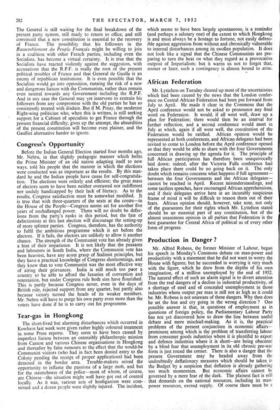Congress's Opportunity
Before the Indian General Election started four months ago, Mr. Nehru, in that slightly pedagogic manner which befits the Prime Minister of an old nation adapting itself to new ways, told his people that the manner in which the elections were conducted was as important as the results. By this stan- dard he and the Indian people have cause for self-congratula- tion. The elections were orderly and efficient; the great mass of electors seem to have been neither overawed nor indifferent nor unduly handicapped by their lack of literacy. As to the results, Congress satisfaction must be somewhat modified. It is true that with three-quarters of the seats at the centre—in the House of the People—Congress seems set for another five years of unchallenged power. There will no doubt be defec- tions from the party's ranks in this period, but the fate of defectionists at this last election will discourage the setting-up of more splinter parties. Congress, therefore, has the authority to fulfil the ambitious programme which it set before the electors. If it fails, the electors are unlikely to allow it another chance. The strength of the Communist vote has already given a hint of their impatience. It is not likely that the peasants and labourers in South India, where the Communist vote has been heaviest, have any acute grasp of Stalinist principles, but they have-a practical knowledge of Congress shortcomings, and they knew that to vote Communist was the most effective way of airing their grievances. India is still much too poor a country to be able to afford the luxuries of corruption and ostentation, but under Congress rule both sins have flourished. This is partly because Congress never, even in the days of British rule, rejected support from any quarter, but partly also because victory turned the heads of its weaker members. Mr. Nehru will have to purge his own party even more than the voters have done if he is to carry out his programme.


































 Previous page
Previous page